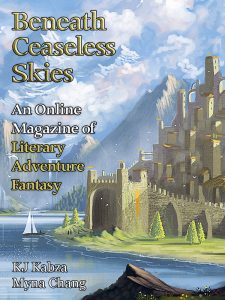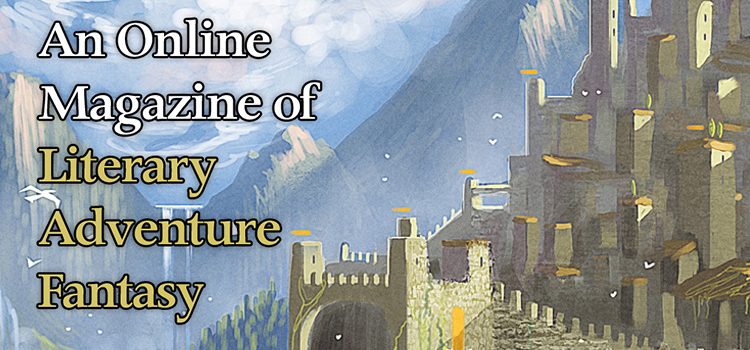Charles Payseur Reviews Short Fiction: Beneath Ceaseless Skies, Escape Pod, Worlds of Possibility, Cast of Wonders
 Beneath Ceaseless Skies 10/5/23, 10/19/23
Beneath Ceaseless Skies 10/5/23, 10/19/23
Escape Pod 10/12/23, 10/19/23, 10/26/23
Worlds of Possibility 10/23
Cast of Wonders 10/14/23, 10/25/23, 10/27/23
Beneath Ceaseless Skies celebrated their 15th anniversary in October with a special double issue including Filip Hajdar Drnovšek Zorko’s novella, “Between Blades”, which unfolds in a world where some people can adopt “swordform,” wherein one in a pair of people becomes a living weapon – a sword or axe or spear or similar – and leads their partner in gladiatorial combat against an opposing team or teams. Leris and Gerthe are quite good as gladiators, though they are also rather unusually limited in that Leris only leads (in spear form) and Gerthe only follows. The details of why become the backbone of the story, and both find their pasts and their regrets coming back in visceral fashion as they otherwise try to gain acclaim and accessto better gladiator circuits outside and inside a large neighboring empire. Like the other stories in the issue, this one is focused on justice and governance, but Zorko also tells a very messy, very intimate story about identity, grief, and the falseness of binary thinking. The setting is well-built and fascinating, the action popping from the screen, and the magic elements wondrous but well-grounded in rules and limitations. But it’s the characters that shine most, offering readers an ultimately triumphant look at partnership, trust, and choice. In the month’s second issue, which leans more into themes of sacrifice and desire, “The Four Gifts of Empress Lessa” by Myna Chang focuses on what one woman does, and gives, to protect her daughter. Because Empress Lessa did not provide a male heir, she’s poisoned by her husband, but not before cursing him with her dying breath if he should harm her daughter, and remaining behind as a ghost even after her replacement is found and moves into her old rooms. The story is about gifts, but not in the tangible sense, the things Lessa gives being more actions she takes at great cost to herself to try and ensure her daughter doesn’t fall victim to the system that killed her. Chang finds hope even in a very grim situation, and reaches for reform and justice even as corruption dominates almost all aspects of this imperial setting.
I’ll close on the October Escape Pod original, “Tuesday, June 13, at the South Valley Time Loop Support Group” by Heather Kamins, which explores the possibilities of time loops, guiding readers through a sampling of ones reminiscent of those found in popular fiction and media. The narrator of the story is an observer, a listener during the support group share, and yet it is their experience that sits at the heart of the story, because it reveals and challenges the expectations of time-loop narratives. Namely, that there is a reason for them, and an end to them. Whether changing as a person, preventing some wrong, or something more random, time loops in fiction act most often as quasidivine (or actually divine) action, happening for a reason. And the story asks what happens if that’s not necessarily the case. Kamins does interesting work in really digging into that, and it’s well worth spending some time with.
The spooky-themed October issue of Worlds of Possibility includes a range of stories and poetry that mostly feature ghosts and hauntings, as is powerfully demonstrated with Tehnuka’s “Please Mind the Poltergeist”. In it, Vani had to move back in with her parents following an illness that is now chronic (or at least very prolonged) that prevented her from doing the fieldwork she wanted to. That fieldwork then passed to a friend and colleague, who tried to soften the sting of loss by offering to have Vani housesit… and ghostsit as well. But not all is doom and danger in this haunting, as Vani and the ghost get to know and care for one another, giving each other space without sacrificing their own well-being. Tehnuka balances the warmth of the relationship that grows against the rather grim realities that have taken the wind outof Vani’s sails, but haven’t quite broken her spirit. It’s lovely. As is Héctor González’s poem “Tithe”, which follows a parent who survived the death of their son seven years ago, lingering in the house they shared and which the boy returns to yearly. This return, this haunting, keeps the ghost present through a feeding on the parent’s grief, so that in some ways the poem questions who is doing the haunting – or at least who is maintaining it. And while the parent is happy to remain if it means they can feel their son, González sidesteps questions of good and bad, healthy and dysfunctional, in favor of simply showing this aching, yearning tableau of loss without judgment, and it’s fantastic.
Cast of Wonders spent most of October framing stories as vehicles for understanding, bridges that can connect across generations, geographies, and galaxies. And yet they can be limiting, as well, especially when concerning the stories we tell about our own futures and possibilities. In Prashanth Srivasta’s “Crystal Hexagons on Windowsills”, the stories involve a mysterious magical academy that has begun to accept new students publicly, opening doors that were long held shut. For one girl, though, as the invitations find her friends and never her, the stories she told about her future turn to dust and ash. She’s left having to start new stories while navigating the bitterness and disappointment of missing out on the adventures such a magical place promises. Srivasta is careful not to embrace the narrative that being excluded from the school must define all those who don’t receive invitations, and the story is much more about changing expectations and – very appropriate for the young adult audience of the venue – growing up.
October’s Escape Pod, meanwhile, was very much about different takes on time travel, and of the stories, Wendy Nikel’s “Driftwood in the Sea of Time” does interesting and innovative work imagining a group of people stranded in a limbo-like sea after trying to change the past. This includes the story’s narrator, who tried to save their brother from an allergic reaction when they were both young. Adrift, the narrator slowly meets other castaways, and with them begins to build something – a structure to house them and also a community that makes life on the Sea of Time more than a lament. Nikel lingers on how time travel is linked to the human urge to revisit and revise the past, and as such, these lost souls are victims of those who would sell time travel knowing people wouldn’t be able to resist. Despite the corporate malfeasance, though, it’s a heartwarming and fun read.
Recommended Stories:
“Between Blades”, Filip Hajdar Drnovšek Zorko (Beneath Ceaseless Skies 10/23)
“Please Mind the Poltergeist”, Tehnuka (Worlds of Possiblity 10/23)
“Crystal Hexagons on Windowsills”, Prashanth Srivasta (Cast of Wonders 10/23)
Charles Payseur is an avid reader, writer, and reviewer of speculative fiction. His works have appeared in The Best American Science Fiction and Fantasy, Lightspeed Magazine, and Beneath Ceaseless Skies, among others, and many are included in his debut collection, The Burning Day and Other Strange Stories (Lethe Press 2021). He is the series editor of We’re Here: The Best Queer Speculative Fiction (Neon Hemlock Press) and a multiple-time Hugo and Ignyte Award finalist for his work at Quick Sip Reviews. When not drunkenly discussing Goosebumps, X-Men comic books, and his cats on his Patreon (/quicksipreviews) and Twitter (@ClowderofTwo), he can probably found raising a beer with his husband, Matt, in their home in Eau Claire, Wisconsin.
This review and more like it in the December and January 2023 issue of Locus.
 While you are here, please take a moment to support Locus with a one-time or recurring donation. We rely on reader donations to keep the magazine and site going, and would like to keep the site paywall free, but WE NEED YOUR FINANCIAL SUPPORT to continue quality coverage of the science fiction and fantasy field.
While you are here, please take a moment to support Locus with a one-time or recurring donation. We rely on reader donations to keep the magazine and site going, and would like to keep the site paywall free, but WE NEED YOUR FINANCIAL SUPPORT to continue quality coverage of the science fiction and fantasy field.
©Locus Magazine. Copyrighted material may not be republished without permission of LSFF.








